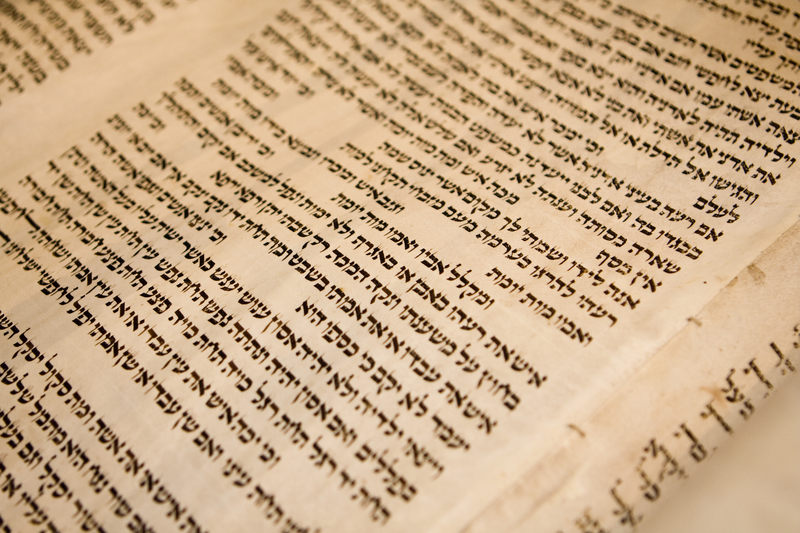
The Torah recognizes that the Satan and his colleagues have been given access to certain points or areas. To counter these - the Torah enjoins us to place competing forces in the form of Holy objects opposite these spots to subdue any negativity they might emit. These areas of susceptibility to the negative forces include the eyes, heart, heel and the entranceway to the home.
Our parasha counts Tefillin and Mezuzot amongst the holy objects needed to counter the negative forces found in some of these areas. In addition based on the Midrash we also assert and advance that the zealous performance of the "lighter" misvot related to the area of the "heel" serve to counter some of the more evasive forces associated with the Satan. We will see through the words of the written and oral tradition how the negative forces associated with these areas are systematically subdued specifically by the placement of the holy objects and fulfillment of these "contra" laws.
Tefillin and Sisit
The Talmud (Menahot 43) cites a teaching in the name of R. Eliezer Ben Yaakov regarding the efficacy of Tefillin, Sisit and Mezuzah in warding off evil. "Whoever has Tefillin upon his head and arm, Sisit upon his garment and a Mezuzah at his entranceway there is the complete presumption that he will not sin." Evidently without surrounding oneself with these holy objects he exposes himself to the Satan who will cause him to sin.
Apparently the wearing of Sisit will protect him from the negative forces that reside by the heart and the eyes - as the verse (Bemidbar 15:39) states "So that you do not follow your heart and your eyes." Similarly the Tefilah of the arm is to be placed by the heart - as the Sages (Menahot 37) learn from a verse in our parasha (11:18) "And you shall place these words on your hearts...and you shall bind them upon your arms." This is to counter the evil inclination who Rav (Berakhot 61) compares to a fly that lies between the two gateways of the heart.
The Tefilah of the head is to be placed "between the eyes" to negate and put fear in any detrimental forces associated with that area. As it is written in Tehillim 36:2 "Evil speaks to the wicked saying let there be no fear of God before his eyes". Similarly the Talmud (Berakhot 6) relates that the forces of the world will see the Tefillin of the head and recognize that this is the object synonymous with the Divine Name.
Mezuzah - To Oppose Evil Stationed at the Entrance
We saw in Beresheet 4:6 that Hashem said to Kayin "Why are you so furious and depressed? If you do good will there not be a special privilege? And if you do not do good - sin is crouching by the entrance way." Hashem notifies Kayin that evil resides by the doorway. The Zohar (Vaethanan 263-265) teaches that there exists an unholy force by the left side of the door way who is given permission to cause spiritual damage.
The commentary Matok Midevash explains in the name of HaAri that this negative force is called מות -death. The Misva to write and establish מזזות - on the right side of the entrance serves to זז or banish this evil husk. The two parashiot written on the inside of the scroll along with the Holy Name שד״י that faces the outside serve to watch the home (Avodah Zara 11) as well as the ones entering and exiting the door way. As the verse states in Tehillim ה׳ ישמר צאתך ובאך - The watcher is none other than the Shehina itself who is specifically placed at the beginning of the upper third area of the doorpost. This placement of the Divine is hinted at in the numerical value of מזוזה - sixty five which is the same as אדנ״י which as is known the Divine Name associated with the Divine presence.
R. Hayim Vital writes (LIkute Torah - Taame Hamisvot) in the name of his teacher R. HaAri that when one exits his home and places his hand on the Mezuzah to kiss it - he should meditate at that time to be saved from the יצר הרע - by considering that the final letters of the word יצר when spelled out יוד צדי רי״ש are synonymous with the Divine Name שד״י associated with protection from Evil. This Holy name will thereby enter into his evil inclination and subdue it.
The Heel - Keeping Lighter Misvot
In Beresheet we are taught that in God's curse of the original serpent he acknowledged that the latter will retain the ability to attack Man via his heel. The verse 3:14 concludes ואתה תשופנו עקב And you will retain the ability to strike him via the heel. Curiously our Parasha is named עקב after its opening words concerning this heel. והיה עקב תשמעון - The Midrash Tanhuma cited by Rashi expounds on these lead words. Namely that it is pertinent that one be zealous to fulfill misvot that others might consider unimportant. Those laws upon whom people use their heel - ekev to trample on. The warning to keep these light misvot serves to protect the entrance of the Satan into our lives.King David acknowledges this and writes 49:6 "Why should I fear in the days of Evil when iniquity surrounds my Heel".
The Satan often begins his work by getting us to sin by minimizing these misvot - and once he gets a foothold - he then proceeds to enter into all facets of a persons life. So here the Torah warns "You can protect against the negative force of the Heel by being zealous to keep the apparently unimportant misvot- or the commandments a person treads on with his heels. These will serve as his protection by severing any access by the Serpent into our lives.
The Sin Kills - Not the Snake
The Talmud (Berakhot 33) relates that there was a type of snake that would harm people. They came and told R. Hanina Ben Dosa - He placed his heel עקבו - over the mouth of the burrow - whereupon the snake exited and bit him and the snake died. He placed it upon his shoulder and brought it to the study hall and said "See my children it is not the snake that kills but rather the sin that kills."
At that time they said "Woe to the man who is met by the snake and woe to the snake that is met by R. Hanina Ben Dosa." It behooves to recognize that these obstacles or forces have been placed in prime areas of our lives. We have been given the tools to protect ourselves via the Misvot. We need worry about these forces - only as to their ability to gain strength via our sins.
We are hence bidden to keep the misvot to attach ourselves to holiness above - as the verse in our parasha promises "Hashem will fulfill his covenant and bestow kindness upon you as he swore to our forefathers."







